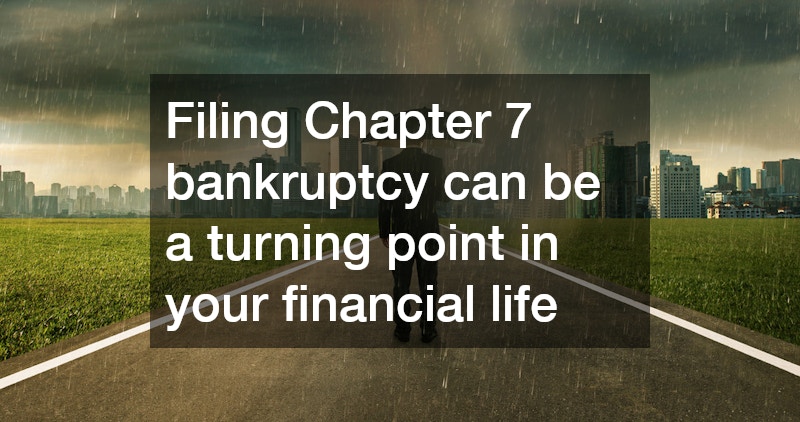Financial difficulties can feel overwhelming, especially when debt begins to affect your daily life and future plans. For many individuals, Chapter 7 bankruptcy offers a legal path to relief, allowing them to wipe the slate clean and start fresh. While bankruptcy is often seen as a last resort, it can actually be a powerful tool to regain control over your finances and build a more stable future. In this article, we’ll explore how Chapter 7 bankruptcy works, its benefits, and how it can help you rebuild your financial life after debt.
What Is Chapter 7 Bankruptcy?
Chapter 7 bankruptcy, sometimes called “liquidation bankruptcy,” is a legal process that allows individuals to eliminate most unsecured debts, such as credit cards, medical bills, and personal loans. Unlike other forms of bankruptcy, Chapter 7 typically provides a faster resolution, often within a few months.
The process involves the sale of non-exempt assets to repay creditors, but many filers qualify to keep essential property, such as their home or vehicle, under state exemption laws.
Filing Chapter 7 bankruptcy can provide immediate relief from collection calls, wage garnishments, and lawsuits, giving debtors the breathing room they need to plan their financial recovery.
Immediate Benefits of Filing Chapter 7 Bankruptcy
One of the most significant advantages of Chapter 7 bankruptcy is the “automatic stay.” Once you file, creditors must immediately stop all collection efforts. This legal protection halts phone calls, letters, and legal actions, offering you peace of mind during a stressful time.
Additionally, Chapter 7 bankruptcy discharges many unsecured debts, freeing you from obligations that were once a heavy burden. This fresh start allows you to focus on rebuilding your credit and financial habits without the constant pressure of overwhelming debt.
Rebuilding Your Credit After Bankruptcy
Many people worry that filing for bankruptcy will ruin their credit forever. While it’s true that a bankruptcy filing will remain on your credit report for up to 10 years, it doesn’t mean you can’t recover and improve your credit score. In fact, Chapter 7 bankruptcy can be the beginning of a new financial chapter.
After discharge, you can take steps such as paying bills on time, reducing unnecessary expenses, and gradually using credit responsibly to rebuild your credit profile. Secured credit cards and small personal loans with timely payments can demonstrate to lenders that you are a trustworthy borrower once again.
Creating a Budget and Financial Plan
Rebuilding your financial future after Chapter 7 bankruptcy involves more than just eliminating debt; it requires a commitment to better money management. Developing a realistic budget helps you track income and expenses, avoid overspending, and save for emergencies.
A detailed financial plan might include setting aside funds for retirement, building an emergency fund, and prioritizing essential expenses. Having a clear plan will reduce financial stress and help you achieve your long-term goals.
Avoiding Common Financial Pitfalls
After bankruptcy, it’s important to learn from past mistakes to avoid repeating them. This means understanding the difference between good and bad debt, living within your means, and being cautious with new credit.
Education plays a key role. Many bankruptcy courts require debt counseling or financial education courses as part of the process, which can provide valuable tools and knowledge to make better financial decisions moving forward.
How This Type of Bankruptcy Impacts Your Future
While Chapter 7 bankruptcy has many benefits, it’s essential to understand its impact on your financial future. The bankruptcy record can affect your ability to obtain certain types of credit, rent an apartment, or even secure some jobs for a period.
However, many people find that with time and responsible financial behavior, these effects diminish. Being transparent with potential lenders or landlords and demonstrating financial responsibility often helps overcome initial hesitations.
When Is It Right Choice?
Chapter 7 bankruptcy is particularly beneficial for individuals with overwhelming unsecured debts and limited income or assets. If you have significant medical bills, credit card debt, or personal loans and cannot realistically repay them, this form of bankruptcy might be the best option.
Conversely, if you have substantial assets you wish to protect or a steady income that allows for repayment plans, other bankruptcy chapters or debt relief options might be more appropriate. Consulting with a qualified bankruptcy attorney can help you understand the best path based on your situation.
Steps to Take When Considering Chapter 7 Bankruptcy
If you’re thinking about filing, start by gathering detailed financial information, including income, expenses, debts, and assets. Next, seek advice from a bankruptcy professional who can evaluate your case and explain the process, eligibility requirements, and consequences.
Completing mandatory credit counseling is a legal requirement before filing. After filing, you’ll work with a bankruptcy trustee to handle asset liquidation and creditor communications.
Filing Chapter 7 bankruptcy can be a turning point in your financial life, offering relief from overwhelming debt and a chance to rebuild with a clean slate. While the decision should be made carefully with professional guidance, many individuals find it empowers them to regain control and work toward a stable, secure financial future.
By understanding the benefits, preparing a solid financial plan, and committing to responsible money management, you can overcome past challenges and create a brighter financial tomorrow. Remember, bankruptcy is not the end but a new beginning to rebuild your financial foundation.





